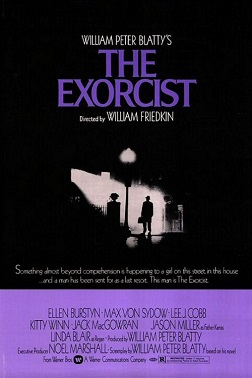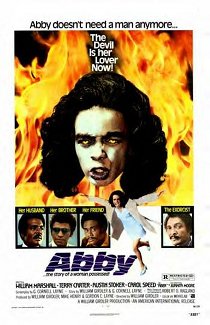
Papa Legba is a lwa in Haitian Vodou, Dominican Vodou, Winti and Louisiana Voodoo, who serves as the intermediary between God and humanity. He stands at a spiritual crossroads and gives permission to speak with the spirits of Guineé, and is believed to speak all human languages. In Haiti, he is the great elocutioner. Legba facilitates communication, speech, and understanding. He is commonly associated with dogs. Papa Legba is invoked at the beginning of every ceremony. Papa Legba has his origins in the historic West African kingdom of Dahomey, located within present-day Benin.

Exorcist II: The Heretic is a 1977 American horror film directed by John Boorman and written by William Goodhart. It is the second installment in The Exorcist film series and the sequel to The Exorcist (1973). The film stars Linda Blair, Richard Burton, Louise Fletcher, Max von Sydow, Kitty Winn, Paul Henreid, and James Earl Jones. The plot is set four years after the previous film and centers on the now 16-year-old Regan MacNeil, who is still recovering from her previous demonic possession.

The Exorcist is a 1973 American supernatural horror film directed by William Friedkin from a screenplay by William Peter Blatty, based on his 1971 novel. The film stars Ellen Burstyn, Max von Sydow, Jason Miller, and Linda Blair. The story follows the demonic possession of a young girl and her mother's attempt to rescue her through an exorcism by two Catholic priests.

Exorcist: The Beginning is a 2004 American supernatural horror film directed by Renny Harlin from a screenplay by Alexi Hawley. It is the fourth installment in The Exorcist film series and serves as a prequel to The Exorcist (1973). The film stars Stellan Skarsgård, Izabella Scorupco, and James D'Arcy. The film follows Father Lankester Merrin, whose faith has been renounced after his experiences in World War II, as he works as an archeologist and discovers dark occurrences while excavating in Kenya.

Dominion: Prequel to the Exorcist is a 2005 American supernatural horror film directed by Paul Schrader and written by William Wisher Jr. and Caleb Carr. The film serves as an alternative prequel to The Exorcist (1973) and is the fifth installment in The Exorcist series. It was intended to be the official prequel to The Exorcist before it was retooled into Exorcist: The Beginning (2004), as Morgan Creek Productions executives feared the already completed film would be unsuccessful. The film stars Stellan Skarsgård, Clara Bellar, Gabriel Mann and Billy Crawford.

Dark Castle Entertainment is an American film production label and a division of Silver Pictures, It was formed in 1998 by Joel Silver, Robert Zemeckis, and Gilbert Adler. Susan Downey was the Vice President of Development until February 2009, a term running congruent to her tenure as a VP of Production at parent company Silver Pictures.

Blacula is a 1972 American blaxploitation vampire horror film directed by William Crain. It stars William Marshall in the title role about an 18th-century African prince named Mamuwalde, who is turned into a vampire by Count Dracula in the Count's castle in Transylvania in the year 1780 after Dracula refuses to help Mamuwalde suppress the slave trade.
William Girdler was an American filmmaker. In a span of six years, from 1972 to 1978, he directed nine feature films in such genres as horror and action. Girdler also wrote and produced three of his features, Abby, Sheba, Baby and The Manitou.

Poltergeist is a 1982 American supernatural horror film directed by Tobe Hooper and written by Steven Spielberg, Michael Grais and Mark Victor from a story by Spielberg. It stars JoBeth Williams, Craig T. Nelson and Beatrice Straight, and was produced by Spielberg and Frank Marshall. The film focuses on a suburban family whose home is invaded by malevolent ghosts that abduct their youngest daughter.
Jeremy Caniglia is an American figurative painter and illustrator, primarily in fantasy and horror genres. He has done book and magazine illustration, conceptual artwork, book and album covers, and comic books, and his work is in several important public collections including the Joslyn Art Museum and Iowa State University. His art has also been shown at the Society of Illustrators' Museum of Illustration.

Beyond the Door is a 1974 supernatural horror film directed by Ovidio G. Assonitis and Roberto Piazzoli, and starring Juliet Mills, Gabriele Lavia, and Richard Johnson. The plot follows a San Francisco housewife who becomes demonically possessed in the midst of a pregnancy. The film was a co-production between the United States and Italy. It was released in the United Kingdom in an extended cut under the title Devil Within Her.
Film Ventures International (FVI) was an independent film production and distribution company originally located in Atlanta, Georgia, during the 1970s. FVI garnered a notorious reputation within the industry for producing films that were highly derivative of many blockbusters of the era. The company mainly specialized in producing and distributing B movies and horror fare.
Edward L. Montoro was an American film producer and distributor known for releasing exploitation films and B-movies during the 1970s and 1980s through his company Film Ventures International. Montoro became notorious for producing and promoting films such as Beyond the Door (1974) and Grizzly (1976) which were highly derivative of the 1970s blockbuster hits The Exorcist and Jaws, respectively.
Carolyn Ann Stewart, known professionally as Carol Speed, was an American actress, singer-songwriter and author. Speed was best known for her roles in films during the 1970s blaxploitation era, most notably starring as Abby Williams in the American International Pictures 1974 blaxploitation horror film Abby (1974).

Blaxploitation is an ethnic subgenre of the exploitation film that emerged in the United States during the early 1970s, after the demand of the Black Panthers for black artists to reclaim the power and rights to their image from the UCLA, and the new rating system within Hollywood allowed up and coming black film makers and actors to create black films for black audiences. The term, a portmanteau of the words "black" and "exploitation", was coined in August 1972 by Junius Griffin, the president of the Beverly Hills–Hollywood NAACP branch. He claimed the genre was "proliferating offenses" to the black community in its perpetuation of stereotypes often involved in crime. After the race films of the 1940s and 1960s, the genre emerged as one of the first in which black characters and communities were protagonists, rather than sidekicks, supportive characters, or victims of brutality. The genre's inception coincides with the rethinking of race relations in the 1970s.
The Razzie Award for Worst Remake, Rip-off or Sequel is an award presented at the annual Golden Raspberry Awards for the worst film adapted from some form of previous material. The category covers films that are prequels, sequels, remakes, reboots, spin-offs, film adaptations of other media franchises, mockbusters and "rip-offs".

The Terror is a 1928 American pre-Code horror film written by Harvey Gates and directed by Roy Del Ruth, based on the 1927 play of the same name by Edgar Wallace. It was the second "all-talking" motion picture released by Warner Bros., following Lights of New York. It was also the first all-talking horror film, made using the Vitaphone sound-on-disc system.

The Exorcist III is a 1990 American psychological horror film written for the screen and directed by William Peter Blatty, based on his 1983 novel Legion. It is the third installment in The Exorcist film series, and the final installment in Blatty's "Trilogy of Faith" after The Ninth Configuration (1980). The film stars George C. Scott, Ed Flanders, Jason Miller, Scott Wilson, Nicol Williamson, and Brad Dourif.

The Exorcist is an American horror media franchise that originated with William Peter Blatty's 1971 horror novel of the same name and most prominently featured in a 1973 film adaptation of the novel, and many subsequent prequels and sequels. All of these installments focus on fictional accounts of people possessed by Pazuzu, the main antagonist of the series, and the efforts of religious authorities to counter this possession.

Warner Bros. Studio Tour Hollywood is a guided walk-through tour of Warner Bros. Studios, Burbank, located in Los Angeles, California. Over a two-to-three-hour period, visitors can glimpse behind the scenes of one of the oldest film studios in the world.













